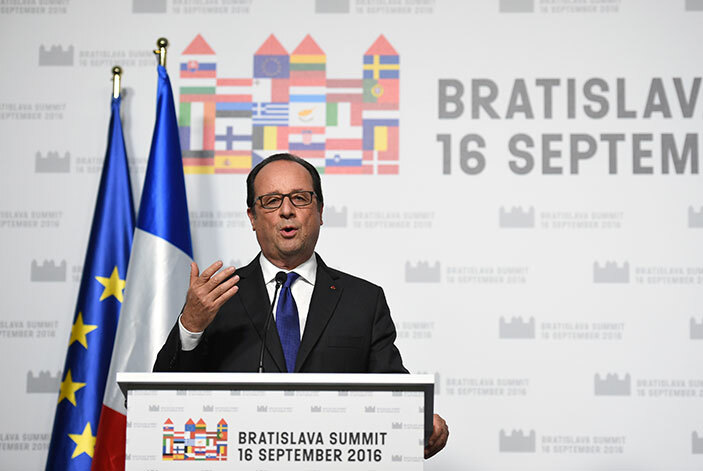Merkel, Hollande vow EU 'success' despite Brexit
Sep 16, 2016
"Germany and France will very intensively play their part in the coming months in order to make all this a success," Merkel at a press conference alongside Hollande.

German Chancellor Angela Merkel and French President Francois Hollande vowed Friday to make the European Union a "success", in a show of unity after a crucial summit to plot the bloc's post-Brexit future.
The joint statement from the continent's traditional axis of power came after the EU's 27 leaders, minus Britain, gathered in a castle overlooking the Slovak capital Bratislava to respond to multiple challenges.
Despite deep divisions across the bloc, the leaders agreed on a "roadmap" for migration, terrorism, defence and the economy which they aim to approve in Rome in March to mark the 60th anniversary of the EU's founding treaties.
"Germany and France will very intensively play their part in the coming months in order to make all this a success," Merkel at a press conference alongside Hollande.
Merkel repeated her warning that the EU was in a "critical situation", but her influence as leader of the EU's biggest economy has been undermined by her unpopular decision to open Germany's doors last year to nearly a million refugees.
Hollande, who leads Europe's top military power now that Britain is on the way out, meanwhile said that "France and Germany will continue to work so that we can deliver concrete measures."
France and Germany produced a joint defence plan in the run-up to the summit, in a sign that the EU's 'big two' wanted to take the lead in rebuilding confidence in the EU following Britain's shock June 23 decision to leave.
 French President Francois Hollande delivers a joint statement with the German Chancellor after the European Union Summit of 27 Heads of State or Government in Bratislava, Slovakia on September 16, 2016. AFP Photo / Stephane De Sakutin
French President Francois Hollande delivers a joint statement with the German Chancellor after the European Union Summit of 27 Heads of State or Government in Bratislava, Slovakia on September 16, 2016. AFP Photo / Stephane De Sakutin
'Sober but not defeatist'
EU President Donald Tusk said the talks -- held in Bratislava Castle with a break for lunch on a cruise ship on the Danube -- were "sober but not defeatist."
The former Polish premier said they wanted to "correct the past mistakes and move on with new solution."
The leaders launched a "Bratislava Process" of reforms at this summit, to be further discussed in Malta early next year and then agreed in Rome. Some defence measures could be signed off at a full EU summit with Britain in December.
European Commission head Jean-Claude Juncker had meanwhile submitted his version on Thursday, including controversial plans to approve an EU military headquarters and combined military force by June 2017.
Britain has always opposed a joint EU military for fear it would overlap with NATO, but the remaining members hope that boosting defence cooperation will give the union something to rally around.
The issue of security was also key following deadly terror attacks in France and Belgium, and with the bloc facing its biggest migration crisis since World War II as refugees flee war in Syria and the Middle East.
Juncker said the leaders had agreed to free up 108 million euros for Bulgaria to boost its border with Turkey, one of the main routes for migrants to enter Europe.
'All on the same boat'?
Greeted by soldiers in bright blue uniforms and ceremonial plumes, the leaders held a first round of talks in the castle then lunched on a river cruise on a German-flagged boat down the Danube to informally discuss Brexit.
The 27 leaders have insisted there will be no formal Brexit talks until Britain triggers the two-year divorce process and says what it wants.
Maltese Premier Joseph Muscat quipped in a tweet: "Bratislava summit was so far a straightforward discussion of options for EU to move ahead. We are all on the same boat, literally."
But cracks in the union are evident everywhere.
The migration crisis is the most divisive issue, with many Eastern European leaders including Slovakian Prime Minister Robert Fico, the summit's host, blaming Merkel for opening the continent's doors.
The Eastern Europeans also oppose compulsory relocation of migrants around the bloc to ease the burden on Greece and Italy, part of more fundamental opposition to power being centralised in Brussels.
Tensions had bubbled up earlier this week when Luxembourg's foreign minister called for Hungary to be suspended from the EU for treating refugees other countries like "animals".
Europe is also divided on the economy, with thrice-bailed out Greece last week gathered mostly centre and centre-left southern EU leaders in Athens to urge their northern counterparts to share more of the migrant burden and ease up on austerity.
